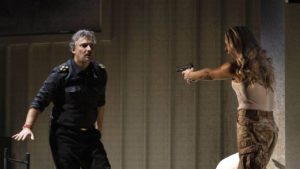
Criticism on Fridays: Femicide As a Norm?
How Modern Artists (& Audiences) Struggle With the Imposed Stories Of Cruelty In Classical Operas
By Polina Lyapustina(Photo: L.Romano)
On Fridays, Polina Lyapustina delivers a short essay on some of the most essential topics in the industry with the intent of establishing a dialogue about the opera world and its future.
This year, Jonas Kaufmann and Maria Agresta open the season at Teatro San Carlo di Napoli with the new stunning production of “Otello,” directed by Mario Martone. Best known for his film work, the Italian director is once again trying to redefine the character of Desdemona — far surpassing the result of the attempts of Amélie Niermeyer at Bayerische Staatsoper in 2018.
Martone carries the story through hundreds of miles and centuries, changes the setting, but it all leads to the same denouement. His Desdemona is not only strong and smart, she is equal to men in many social aspects, and yet comes on stage to die. No matter how much the image of Desdemona (eternal and as relevant as ever) progresses in the modern world, no one understands how to save her.
And do we really need to? Because this opera is called “Otello” for a reason. The incredible art of Verdi’s music, Michele Mariotti’s dazzling reading of a score, and the voice of Jonas Kaufmann eventually lead us to the sorrow and grief of the plight and sad end of a once-great hero.
As Maurice Sallepitynoted in his review for French ForumOpera:
“And if we still pity him, despite the crime he has just experienced, it is because we know that what we saw is theater. Reality would have horrified us and we would only feel disgusted for the murderer. To treat this theatrical murder as if it were a real murder means to make Boito and Verdi moralists, but they were not.”
Sure, they were not, and I don’t know to whom they would moralize at that time, but what we are now seeing is a world in which femicide has not only grown to an unbelievable level but has proven to be totally resistant to public opinion, strengthened by the drop in education and many “modern” laws around the world.
As such, I have started thinking that maybe it’s time. Not only is it time to make Desdemona stronger before handing her over to die, but to stop seeing her murder as theater where it can easily be interpreted just as farce and entertainment. Because if instead of being enlightened, what will happen is many audiences will continue to get spoiled by the opportunity to see and enjoy this kind of cruelty.
Around this time three years ago, I was preparing for a trip to Munich where Jonas Kaufmann was going to polish the role of Otello, which he has debuted a year before on the stage of ROH.
My 4-and-a-half-year-old daughter joined me while watching the ROH performance. I still remember how effusive her reaction was to the final act. It wasn’t as if she had never seen people dying in operas, and yet, for a good 20 minutes, I tried to explain to this kid all the difficult social and historical circumstances of Otello’s life. She left me without giving any sign of acceptance.
The same evening, she came to me again very determined,
“Are you going to interview Jonas Kaufmann, mum?” I wasn’t. “But you should!” Her voice lost all its rigidity, she was now very sad.
“I heard everything you said about Otello, I’ve been thinking about it the whole day. I understand, Otello had a hard life, he was betrayed, he thought he had lost her already, and yet! None of this was a reason to kill his wife!”
I wasn’t ready to hear this kind of uprightness and morality from the 4-year-old. I was certainly proud, but even more, I wanted to comfort her at that moment. I probably planned to say something about “it’s just a theatre,” but she beat me to it and shattered any arguments into ashes.
“You know, I love opera so much, and even more I love Jonas Kaufmann. And what happens when kids love someone? They learn from them! You must tell Jonas Kaufmann never to play Otello, so kids would never think this could be done.”
One tenor and one very little girl. One of those who, we think, are not capable of understanding such stories.
4-years-old.
And yet, seeing the struggles of modern directors, I think that the girl, at the time, unspoiled by socialization, saw the morality of this story much sharper, and perhaps more clearly.
I never had a chance to pass on her messages to Jonas Kaufmann, but while expecting my second daughter and reading the daily reports of femicide from around the world, I now think I should. If not to prevent talents from making stunning acts out of the horrible stories, but at least to remember that in our times we have to moralize those stories.
Even if it spoils all the fun.
When we leave the theatre today, I hope we come out enlightened. I hope it gives us the knowledge, forces, and morality to stand for the good.
Otherwise, what’s the use?


